- Home
- Barbara Kingsolver
The Bean Trees Page 2
The Bean Trees Read online
Page 2
I wanted Mama to be home when I got there, so I could bawl my head off and tell her I was quitting. But she wasn't, and by the time she came in with a bag of groceries and a bushel basket of ironing for the weekend I was over it for the most part. I told her the whole thing, even Jolene's pink bow-ribbon top and the blood and all, and of course Newt, and then I told her I'd probably seen the worst I was going to see so there was no reason to quit now.
She gave me the biggest hug and said, "Missy, I have never seen the likes of you." We didn't talk too much more about it but I felt better with her there, the two of us moving around each other in the kitchen making boiled greens and eggs for dinner while it finally went dark outside. Every once in a while she would look over at me and just shake her head.
There were two things about Mama. One is she always expected the best out of me. And the other is that then no matter what I did, whatever I came home with, she acted like it was the moon I had just hung up in the sky and plugged in all the stars. Like I was that good.
I kept that job. I stayed there over five and a half years and counted more platelets than you can think about. A person might think I didn't do much else with all that time other than keeping Mama entertained and off and on dating Sparky Pike--who most people considered to be a high-class catch because he had a steady job as a gas-meter man--until I got fed up with hearing who laid out in their backyards by their meters wearing what (or nothing-but-what) in the summer-time.
But I had a plan. In our high school days the general idea of fun had been to paint "Class of '75" on the water tower, or maybe tie some farmer's goat up there on Halloween, but now I had serious intentions. In my first few years at Pittman County Hospital I was able to help Mama out with the rent and the bills and still managed to save up a couple hundred dollars. With most of it I bought a car, a '55 Volkswagen bug with no windows to speak of, and no back seat and no starter. But it was easy to push start without help once you got the hang of it, the wrong foot on the clutch and the other leg out the door, especially if you parked on a hill, which in that part of Kentucky you could hardly do anything but. In this car I intended to drive out of Pittman County one day and never look back, except maybe for Mama.
The day I brought it home, she knew I was going to get away. She took one look and said, "Well, if you're going to have you an old car you're going to know how to drive an old car." What she meant was how to handle anything that might come along, I suppose, because she stood in the road with her arms crossed and watched while I took off all four tires and put them back on. "That's good, Missy," she said. "You'll drive away from here yet. I expect the last I'll see of you will be your hind end." She said, "What do you do if I let the air out of the front tire?" Which she did. I said, "Easy, I put on the spare," which believe it or not that damned old car actually had.
Then she let out the back one too and said, "Now what?" Mama had evidently run into trouble along these lines, at some point in her life with Foster and an Oldsmobile, and she wanted to be sure I was prepared.
I thought, and then I said, "I have a bicycle pump. I can get enough air in it to drive down to Norman Strick's and get it pumped up the rest of the way." And she just stood there with her arms crossed and I could see that she nor God nor nobody else was going to do it for me, so I closed my eyes and went at that tire for everything I was worth.
Mama hadn't been there that day. She couldn't know that all I was seeing behind those shut eyes was Newt Hardbine's daddy flying up into the air, in slow motion, like a fish flinging sideways out of the water. And Newt laid out like a hooked bass.
When I drove over the Pittman line I made two promises to myself. One I kept, the other I did not.
The first was that I would get myself a new name. I wasn't crazy about anything I had been called up to that point in life, and this seemed like the time to make a clean break. I didn't have any special name in mind, but just wanted a change. The more I thought about it, the more it seemed to me that a name is not something a person really has the right to pick out, but is something you're provided with more or less by chance. I decided to let the gas tank decide. Wherever it ran out, I'd look for a sign.
I came pretty close to being named after Homer, Illinois, but kept pushing it. I kept my fingers crossed through Sidney, Sadorus, Cerro Gordo, Decatur, and Blue Mound, and coasted into Taylorville on the fumes. And so I am Taylor Greer. I suppose you could say I had some part in choosing this name, but there was enough of destiny in it to satisfy me.
The second promise, the one that I broke, had to do with where I would end up. I had looked at some maps, but since I had never in my own memory been outside of Kentucky (I was evidently born across the river in Cincinnati, but that is beside the point), I had no way of knowing why or how any particular place might be preferable to any other. That is, apart from the pictures on the gas station brochures: Tennessee claimed to be the Volunteer State, and Missouri the Show-Me State, whatever that might mean, and nearly everyplace appeared to have plenty of ladies in fifties hairdos standing near waterfalls. These brochures I naturally did not trust as far as I could throw them out the window. Even Pittman, after all, had once been chosen an All-Kentucky City, on the basis of what I do not know. Its abundance of potato bugs and gossip, perhaps. I knew how people could toot their own horn without any earthly cause.
And so what I promised myself is that I would drive west until my car stopped running, and there I would stay. But there were some things I hadn't considered. Mama taught me well about tires, and many other things besides, but I knew nothing of rocker arms. And I did not know about the Great Plain.
The sight of it filled me with despair. I turned south from Wichita, Kansas, thinking I might find a way around it, but I didn't. There was central Oklahoma. I had never imagined that any part of a round earth could be so flat. In Kentucky you could never see too far, since there were always mountains blocking the other side of your view, and it left you the chance to think something good might be just over the next hill. But out there on the plain it was all laid out right in front of you, and no matter how far you looked it didn't get any better. Oklahoma made me feel there was nothing left to hope for.
My car gave out somewhere in the middle of a great emptiness that according to the road signs was owned by the Cherokee tribe. Suddenly the steering wheel bore no relation to where the car was going. By the grace of some miracle I surely did not yet deserve, I managed to wobble off the highway all in one piece and find a service station.
The man who straightened out my rocker arm was named Bob Two Two. I am not saying he didn't ask a fair price--I should have been able to fix it myself--but he went home that night with his pocket full of something near half the money I had. I sat in the parking lot looking out over that godless stretch of nothing and came the closest I have ever come to cashing in and plowing under. But there was no sense in that. My car was fixed.
I had to laugh, really. All my life, Mama had talked about the Cherokee Nation as our ace in the hole. She'd had an old grandpa that was full-blooded Cherokee, one of the few that got left behind in Tennessee because he was too old or too ornery to get marched over to Oklahoma. Mama would say, "If we run out of luck we can always go live on the Cherokee Nation." She and I both had enough blood to qualify. According to Mama, if you're one-eighth or more they let you in. She called this our "head rights."
Of course, if she had ever been there she would have known it was not a place you'd ever go to live without some kind of lethal weapon aimed at your hind end. It was clear to me that the whole intention of bringing the Cherokees here was to get them to lie down and die without a fight. The Cherokees believed God was in trees. Mama told me this. When I was a kid I would climb as high as I could in a tree and not come down until dinner. "That's your Indian blood," she would say. "You're trying to see God."
From what I could see, there was not one tree in the entire state of Oklahoma.
The sun was headed fast for the flat horizon, and then t
here would be nothing but twelve hours of headlights in front of me. I was in a hurry to get out of there. My engine was still running from Bob Two Two's jumper cables, and I hated to let a good start go to waste, but I was tired and didn't want to begin a night of driving without a cup of coffee and something to eat. I drove across the big patch of dirt that lay between the garage and another small brick-shaped building that had a neon Budweiser light in the window.
When I drove around to the front, a swarm of little boys came down on my car like bees on a bear.
"Wash your windows, lady," they said. "Dollar for the whole car."
"I got no windows," I told them. I reached back and put my hand through the side window hole to show them. "See, just the windshield. Lucky me, because I got no dollar either."
The boys went around the car putting their hands through all the window holes again and again. I thought twice about leaving my stuff in the car while I went into the restaurant. I didn't have anything worth taking, but then it was all I had.
I asked them, "You boys live around here?"
They looked at each other. "Yeah," one of them said. "He does. He's my brother. Them two don't."
"You ever hear of a Polaroid memory?"
The big one nodded. The others just stared.
"Well, I got one," I said. "It's just like a camera. My memory just took a picture of what y'all look like, so don't take any stuff out of my car, okay? You take any stuff, you're in for it."
The kids backed off from the car rubbing their hands on their sides, like they were wiping off anything their hands might have already imagined grabbing onto.
After the cool night, the hot air inside the bar hit me like something you could swim through. Near the door there was a wire rack of postcards. Some had Indians in various hokey poses, but most were views-from-the-air of Oral Roberts University, which apparently was in the vicinity--although I'm pretty sure if it had been within two hundred miles I could have seen it from the parking lot.
I picked out one with two Indian women on it, an older and a younger, pretty one, standing side by side next to some corn-grinding thing. I had often wondered which one-eighth of me was Cherokee, and in this picture I could begin to see it. The long, straight hair and the slender wrist bones. The younger one was wearing my two favorite colors, turquoise and red. I would write on it to Mama, "Here's us."
I sat down at the counter and gave the man a dime for the postcard. I nodded when he pointed the pot of coffee at me, and he filled my cup. The jukebox was playing Kenny Rogers and the TV behind the counter was turned on, although the sound was off. It was some program about, or from, Oral Roberts University, which I recognized from the postcards. Frequently a man with clean fat hands and a crest of hair like a woodpecker would talk on and on without sound. I presumed this was Oral Roberts himself, though of course I can't say for certain that it was. From time to time a line of blue writing would run across the bottom of the screen. Sometimes it gave a telephone number, and sometimes it just said "Praise the Lord." I wrote my postcard to Mama. "Grandpa had the right idea," I told her. "No offense, but the Cherokee Nation is crap. Headed west. Love, M." It didn't seem right just yet to sign it Taylor.
The place was cleared out except for two men at the counter, a white guy and an Indian. They both wore cowboy hats. I thought to myself, I guess now Indians can be cowboys too, though probably not vice versa. The Indian man wore a brown hat and had a brown, fine-looking face that reminded me of an eagle, not that I had ever actually seen an eagle. He was somewhere between young and not so young. I tried to imagine having a great grandpa with a nose like that and such a smooth chin. The other one in the gray hat looked like he had a mean streak to him. You can tell the kind that's looking for trouble. They were drinking beers and watching Oral on the silent TV, and once in a great while they would say something to each other in a low voice. They might have been on their first couple of beers, or they might have been drinking since sunup--with some types you can't tell until it's too late. I tried to recall where I had been at sunup that day. It was in St. Louis, Missouri, where they have that giant McDonald's thing towering over the city, but that didn't seem possible. That seemed like about a blue moon ago.
"You got anything to eat that costs less than a dollar?" I asked the old guy behind the counter. He crossed his arms and looked at me for a minute, as if nobody had ever asked him this before.
"Ketchup," the gray-hat cowboy said. "Earl serves up a mean bottle of ketchup, don't you, Earl?" He slid the ketchup bottle down the counter so hard it rammed my cup and spilled out probably five cents' worth of coffee.
"You think being busted is a joke?" I asked him. I slid the bottle back and hit his beer mug dead center, although it did not spill. He looked at me and then looked back to the TV, like I wasn't the kind of thing to be bothered with. It made me want to spit nails.
"He don't mean nothing by it, miss," Earl told me. "He's got a bug up his butt. I can get you a burger for ninety-nine cents."
"Okay," I told Earl.
Maybe ten or fifteen minutes passed before the food came, and I kept myself awake trying to guess what the fat-hands man was saying on the TV screen. Earl's place could have done with a scrub. I could see through the open door into the kitchen, and the black grease on the back of the stove looked like it had been there since the Dawn of Man. The air in there was so hot and stale I felt like I had to breathe it twice to get any oxygen out of it. The coffee did nothing to wake me up. My food came just as I was about to step outside for some air.
I noticed another woman in the bar sitting at one of the tables near the back. She was a round woman, not too old, wrapped in a blanket. It was not an Indian blanket but a plain pink wool blanket with a satin band sewed on the edge, exactly like one Mama and I had at home. Her hair lay across her shoulders in a pair of skinny, lifeless plaits. She was not eating or drinking, but fairly often she would glance up at the two men, or maybe just one of them, I couldn't really tell. The way she looked at them made me feel like if I had better sense I'd be scared.
Earl's ninety-nine-cent burger brought me around a little, though I still felt like my head had been stuffed with that fluffy white business they use in life preservers. I imagined myself stepping outside and the wind just scattering me. I would float out over the flat, dark plain like the silvery fuzz from a milk-weed pod.
Putting it off, I read all the signs on the walls, one by one, which said things like THEY CAN'T FIRE ME, SLAVES HAVE TO BE SOLD and IN CASE OF FIRE YELL FIRE. The television kept on saying PRAISE THE LORD. 1-800-THE LORD. I tried to concentrate on keeping myself all in one place, even if it wasn't a spot I was crazy about. Then I went outside. The air was cool and I drank it too fast, getting a little dizzy. I sat with my hands on the steering wheel for a few minutes trying to think myself into the right mood for driving all night across Oklahoma.
I jumped when she pecked on the windshield. It was the round woman in the blanket.
"No thanks," I said. I thought she wanted to wash the windshield, but instead she went around to the other side and opened the door. "You need a lift someplace?" I asked her.
Her body, her face, and her eyes were all round. She was someone you could have drawn a picture of by tracing around dimes and quarters and jar tops. She opened up the blanket and took out something alive. It was a child. She wrapped her blanket around and around it until it became a round bundle with a head. Then she set this bundle down on the seat of my car.
"Take this baby," she said.
It wasn't a baby, exactly. It was probably old enough to walk, though not so big that it couldn't be easily carried. Somewhere between a baby and a person.
"Where do you want me to take it?"
She looked back at the bar, and then looked at me. "Just take it."
I waited a minute, thinking that soon my mind would clear and I would understand what she was saying. It didn't. The child had the exact same round eyes. All four of those eyes were hanging there in the darkness,
hanging on me, waiting. The Budweiser sign blinked on and off, on and off, throwing a faint light that made the whites of their eyes look orange.
"Is this your kid?"
She shook her head. "My dead sister's."
"Are you saying you want to give me this child?"
"Yes."
"If I wanted a baby I would have stayed in Kentucky," I informed her. "I could have had babies coming out my ears by now."
A man came out of the bar, gray hat or brown hat I couldn't tell because my car was parked some distance from the door. He got into a pickup truck but didn't start the ignition or turn on the lights.
"Is that your man in there, in the bar?" I asked her.
"Don't go back in there. I'm not saying why. Just don't."
"Look," I said, "even if you wanted to, you can't just give somebody a kid. You got to have the papers and stuff. Even a car has papers, to prove you didn't steal it."
"This baby's got no papers. There isn't nobody knows it's alive, or cares. Nobody that matters, like the police or nothing like that. This baby was born in a Plymouth."
"Well, it didn't happen this morning," I said. "Plymouth or no Plymouth, this child has been around long enough for somebody to notice." I had a foggy understanding that I wasn't arguing the right point. This was getting us nowhere.
She put her hands where the child's shoulders might be, under all that blanket, and pushed it gently back into the seat, trying to make it belong there. She looked at it for a long time. Then she closed the door and walked away.
As I watched her I was thinking that she wasn't really round. Without the child and the blanket she walked away from my car a very thin woman.

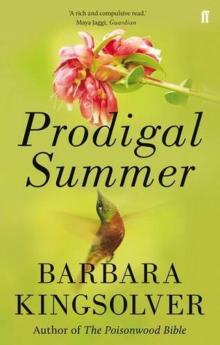 Prodigal Summer: A Novel
Prodigal Summer: A Novel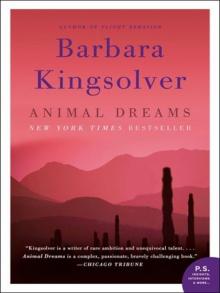 Animal Dreams: A Novel
Animal Dreams: A Novel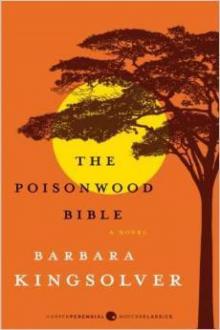 The Poisonwood Bible
The Poisonwood Bible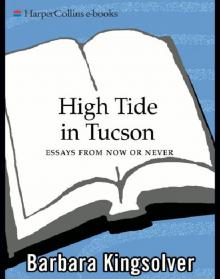 High Tide in Tucson
High Tide in Tucson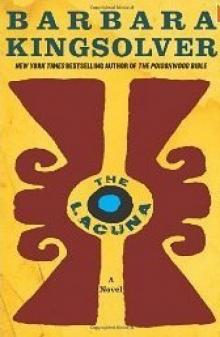 The Lacuna
The Lacuna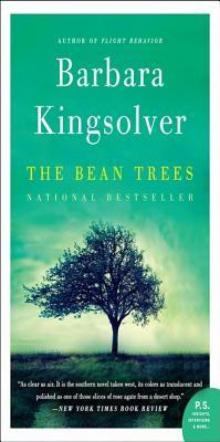 The Bean Trees
The Bean Trees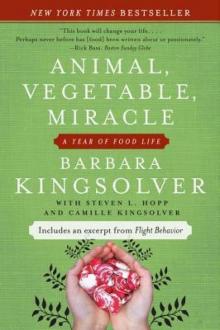 Animal, Vegetable, Miracle: A Year of Food Life
Animal, Vegetable, Miracle: A Year of Food Life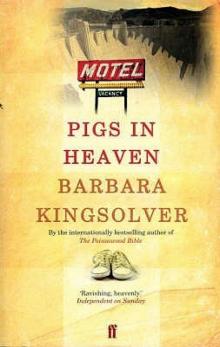 Pigs in Heaven
Pigs in Heaven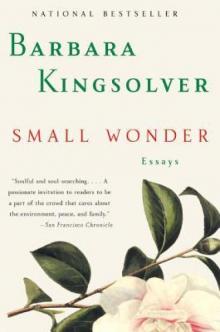 Small Wonder
Small Wonder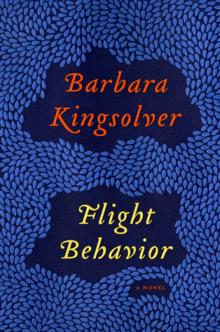 Flight Behavior
Flight Behavior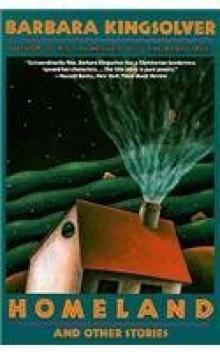 Homeland and Other Stories
Homeland and Other Stories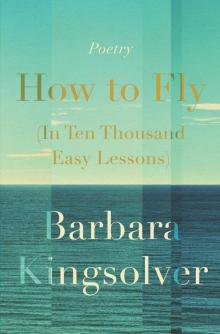 How to Fly (In Ten Thousand Easy Lessons)
How to Fly (In Ten Thousand Easy Lessons) Unsheltered
Unsheltered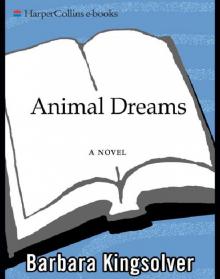 Animal Dreams
Animal Dreams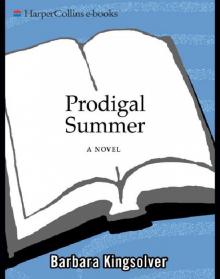 Prodigal Summer
Prodigal Summer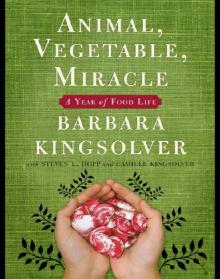 Animal, Vegetable, Miracle
Animal, Vegetable, Miracle